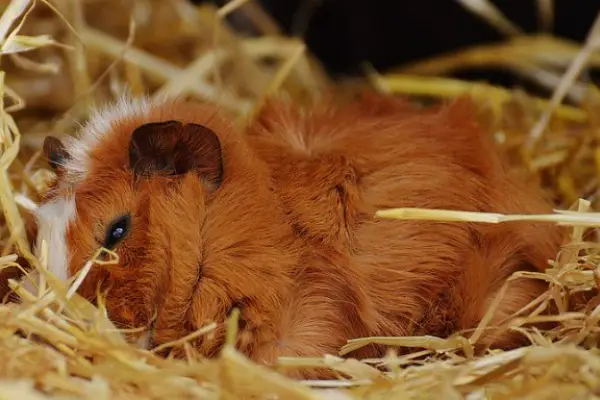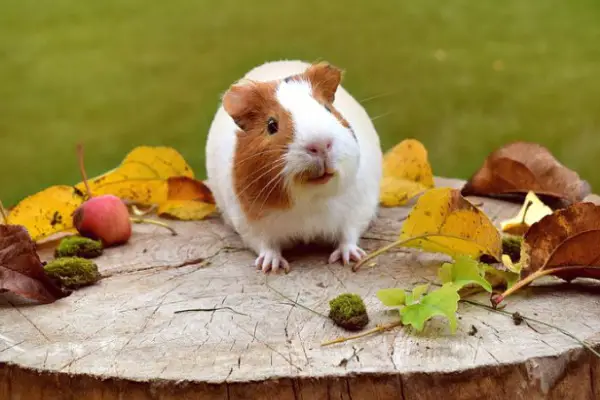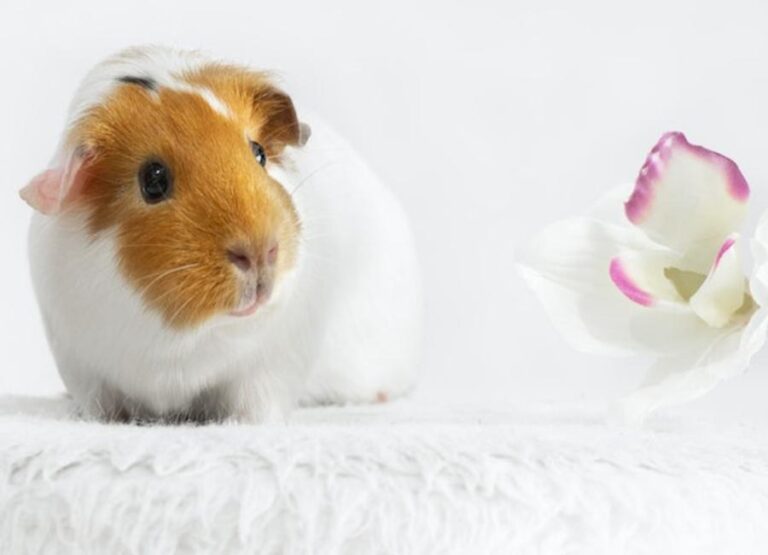Can Guinea Pigs Eat Celery [How To Feed]
![Can Guinea Pigs Eat Celery [How To Feed] Can Guinea Pigs Eat Celery](https://petcreeks.com/wp-content/uploads/2022/04/Can-Guinea-Pigs-Eat-Celery.jpg)
Can guinea pigs eat celery? Let’s discuss…
Looking for a healthy snack to feed your furry friend? You might have heard that humans should eat their greens, but what about guinea pigs?
If you’re wondering whether celery is a safe vegetable for your pet to munch on, you’ve come to the right place!
In this post, we’ll explore the nutritional benefits of celery for guinea pigs, as well as some important considerations to keep in mind when feeding it to them.
Let’s get started!
Can Guinea Pigs Eat Celery
Yes, guinea pigs can eat celery safely and in moderation. Celery stalks, leaves, and even the stringy parts are safe for them to consume.
However, veterinarians do not recommend feeding celery to guinea pigs on a regular basis.
It is important to rinse the celery before feeding it to your guinea pig.
How to Feed Celery to Your Guinea Pigs
Here’s a step-by-step process for feeding celery to guinea pigs:
- Using running water, thoroughly wash the celery to get rid of any dirt or pesticides.
- Around the size of your guinea pig’s mouth, slice the celery into little pieces. The celery can be cut into pieces or thin slices.
- Give your guinea pig celery sometimes as a treat or to round out their normal diet. A diet that is rich in hay, seasonal vegetables, and occasional fruits is necessary for guinea pigs.
- Put the celery on a plate or in a bowl and give it to your guinea pig.
- Watch your guinea pig closely while they chew the celery to prevent choking and ensure appropriate chewing technique.
- After a few hours, remove any uneaten celery from your guinea pig’s cage to keep it from deteriorating and luring pests.
- In order to provide your guinea pig with a healthy diet, repeat this process as often as you like.
Potential Benefits of Celery for Guinea Pigs
Here are some potential benefits of feeding celery to guinea pigs:
- Good source of vitamin C: Guinea pigs are unable to produce their own vitamin C, so they need to get it from their diet. Celery is a good source of vitamin C, which is important for their overall health.
- Contains antioxidants: Celery contains antioxidants like phenolic acids and flavonoids, which can help protect the body against damage from free radicals.
- Good source of fiber: The fiber in celery can help promote healthy digestion and prevent constipation in guinea pigs.
- Low in calories: Celery is a low-calorie food, which can be beneficial for guinea pigs that need to maintain a healthy weight.
- Contains essential minerals: Celery is rich in essential minerals like potassium, calcium, and magnesium, which are important for guinea pigs’ bone health.
- Helps with hydration: Celery contains a high amount of water, which can help keep guinea pigs hydrated.
- Can provide enrichment: Feeding celery to guinea pigs can provide them with mental and physical stimulation, as they enjoy exploring and playing with new foods.
- Supports a varied diet: Guinea pigs benefit from a varied diet that includes a range of fruits, vegetables, and hay, and celery is a great addition to their diet to ensure they are getting a range of nutrients.
- Helps with dental health: The act of chewing on celery can help keep guinea pigs’ teeth healthy and prevent issues like overgrown teeth, which can be painful and lead to other health problems.
It’s important to note that guinea pigs should only be fed celery in moderation, as overfeeding can lead to digestive upset or other health issues.
Potential health risks of feeding celery to Guinea Pigs
Here are some potential health risks of feeding celery to guinea pigs:
- Digestive Problems: Celery includes a lot of fiber, which in guinea pigs can lead to digestive issues like bloating, gas, and diarrhea.
- Kidney Stones: Celery has a lot of oxalates, which can cause kidney stones to develop in guinea pigs if they eat it in excess.
- Urinary Tract Infections: High quantities of calcium and oxalates in celery can make guinea pigs more susceptible to urinary tract infections.
- Dental Problems: Celery’s fibrous, rough texture can make it difficult for guinea pigs to chew, which can cause dental issues including growing teeth and mouth sores.
- Allergic Reactions: Celery allergies in certain guinea pigs can result in symptoms such as skin rashes, itching, and respiratory difficulty.
- Nutritional imbalances: Although celery is an excellent source of vitamin C, it is deficient in other vital elements, such as calcium and vitamin D, those guinea pigs require. Celery overconsumption can cause nutrient shortages and imbalances.
- Obesity: Although celery is high in fiber and low in calories, giving too much of it to guinea pigs without balancing it with other meals can still result in obesity.
- Choking Hazard: Due to their short throats, guinea pigs are susceptible to choking on substantial celery bits. When giving it to them, always chop it into little, bite-sized pieces.
- Pesticide Remains: Pesticides and other chemicals are frequently applied to celery, which can be dangerous for guinea pigs to eat. Celery should always be carefully washed before being given to guinea pigs to avoid the chance of pesticide exposure.
Different ways of incorporating celery into the guinea pig diet
Here are some common ways of incorporating celery into your guinea pig diet:
- Raw celery sticks: Celery sticks in their raw state can be consumed by guinea pigs as a snack or as a meal. To reduce choking risks, chop the celery into little pieces.
- Celery leaves: Celery leaves are a favorite snack of guinea pigs. You may combine them with other leafy greens like spinach or romaine lettuce.
- Celery purée: To produce a nice and nourishing snack for your guinea pig, purée the celery and combine it with other fruits or vegetables.
- Celery juice: To make a cool beverage for your guinea pig, you can also juice celery and combine it with other fruits and vegetables.
- Celery seed: As a tiny portion of their diet, guinea pigs can consume celery seeds. Smash the seeds and add them to your guinea pig’s meal as a garnish. But be careful not to overfeed them, as seeds can contain a lot of fat.
- Celery and carrot salad: Salad made of chopped celery and carrots can be served as a side dish with the main course for your guinea pig.
- Celery and bell pepper kabobs: For a delightful and entertaining treat for your guinea pig, alternate pieces of celery and bell pepper on a skewer.
- Celery and parsley mix: Combine finely chopped celery and parsley to make a tasty and nourishing treat for your guinea pig. Vitamin C, which is crucial for guinea pig health, is also abundant in parsley.
- Celery and apple mix: Chop celery and apples into small pieces, then combine them to make a crunchy, sweet snack for your guinea pig.
- Celery and cucumber mix: Chunks of celery and cucumber can be combined to provide a cool snack for your guinea pig on a hot day.
Other safe fruits and veggies for guinea pigs:
Frequently Asked Questions
How often can I feed celery to my guinea pig?
Celery should be given to guinea pigs in moderation, once or twice a week, as a treat. It should not be a regular part of their diet.
Is it safe to give my guinea pig the leaves of celery?
Yes, the leaves of celery are safe for guinea pigs to eat. In fact, they contain more vitamin C than the stalks.
Can guinea pigs eat cooked celery?
No, cooked celery should not be given to guinea pigs. Guinea pigs can only eat raw fruits and vegetables.
What are the benefits of feeding celery to guinea pigs?
Celery is a good source of vitamin C, which is essential for guinea pigs. It also contains fiber, which can aid digestion.
Can overfeeding celery be harmful to my guinea pig?
Yes, overfeeding celery can be harmful to guinea pigs.
Because of its high water content, too much celery can cause diarrhea and other digestive problems.
It is important to feed celery in moderation as part of a balanced diet.
Conclusion
Yes, guinea pigs can eat celery. It is important to note that celery should be given to guinea pigs in moderation, as it is high in fiber and can cause digestive problems if overconsumed.
As with all new foods, it is recommended to introduce celery gradually into a guinea pig’s diet and monitor for any adverse reactions.
Additionally, guinea pigs should only consume fresh, raw celery, as cooked celery can be harmful to their digestive system.
Providing a varied diet of fresh vegetables and hay is important for the health of guinea pigs.

![Can Guinea Pigs Eat Tangerines [How To Feed] Can Guinea Pigs Eat Tangerines](https://petcreeks.com/wp-content/uploads/2022/04/Can-Guinea-Pigs-Eat-Tangerines-768x614.jpg)

![What Can Guinea Pigs Not Eat [14 Unsafe Foods] What Can Guinea Pigs Not Eat](https://petcreeks.com/wp-content/uploads/2022/04/What-Can-Guinea-Pigs-Not-Eat.jpg)


